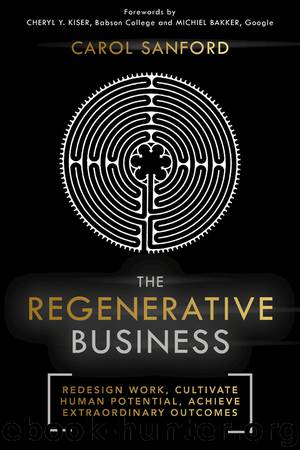The Regenerative Business by Carol Sanford

Author:Carol Sanford
Language: eng
Format: epub
Publisher: Quercus
The Behavioral Paradigm
Control over labor leads to external motivation
The machine paradigm enabled the rapid development of the industrial era, but at some point the speed and predictability of industrial machines outstripped the predictability of the people operating them. At this point, attention shifted from how to control the manufacturing process to how to control labor.
In the early twentieth century, psychologist John Watson persuaded leaders of industry to fund his research laboratory at Johns Hopkins University. He promised that his research would show them how to control people’s behavior with the same level of scientific predictability and rigor that engineers were able to bring to the design of machinery. This work, which founded the discipline of behaviorism, was predicated on the belief that internal, subjective experience was irrelevant. The only phenomena that mattered were behaviors that could be objectively observed, categorized, and conditioned. Watson’s research into operant conditioning, which was extended and elaborated by such well-known behaviorists as B. F. Skinner, had enormous impact later in the century on the field of work design, education, parenting, and advertising.5
Behavioral psychology is effective, in large part, because it taps into characteristics that humans share with many other animals. Through research on rats, primates, and other mammals, behaviorists were able to accurately describe how to condition people’s behavior.
Like the aristocratic and mechanistic paradigms that preceded it, this approach assumes an outside authority whose goals drive all activity and thus shape employee behavior. It ignores and therefore fails to take advantage of many of the higher functions of human intelligence. Companies and all of their people have the innate potential for reflection and self-management, qualities they need to develop in order to move into the uncharted territories where innovation occurs. Business practices like the following, which are based on the premises of behavioral psychology, inevitably have far more negative than positive effects.
Incentive is the promise of a future reward, designed to stimulate a singleminded pursuit. For example, companies might promise salespeople a bonus for exceeding certain targets. An incentive generates a very specific stimulating effect on the brain by highlighting a gap between what people have and what they could have. This creates the compelling desire to close the gap, and thus serve as a source of energy to drive the development of desired behaviors and outcomes.
Because incentives trigger a primitive, engrained response, they produce a number of unintended consequences. First, they strongly reinforce self-aggrandizement, so much so that people can dedicate highly creative energy toward the counterproductive purpose of gaming the system. Second, they focus people’s attention on the incentive, rather than on customers. Third, they reduce the sense of agency and locus of control in workers, placing it instead in the hands of those who are creating the incentives and providing the rewards. This not only undermines the ability to be self-managing, it also infantilizes people. Thus it is small wonder, given the ubiquity of this practice, that Americans struggle to see themselves as engaged, empowered participants in their own democratic institutions.
Rewards are designed to build and reinforce bonds of loyalty between workers and the superiors who bestow them.
Download
This site does not store any files on its server. We only index and link to content provided by other sites. Please contact the content providers to delete copyright contents if any and email us, we'll remove relevant links or contents immediately.
Tools of Titans by Timothy Ferriss(8357)
Change Your Questions, Change Your Life by Marilee Adams(7725)
Deep Work by Cal Newport(7053)
Playing to Win_ How Strategy Really Works by A.G. Lafley & Roger L. Martin(6199)
Man-made Catastrophes and Risk Information Concealment by Dmitry Chernov & Didier Sornette(5993)
Digital Minimalism by Cal Newport;(5743)
Big Magic: Creative Living Beyond Fear by Elizabeth Gilbert(5733)
The Slight Edge by Jeff Olson(5402)
Ego Is the Enemy by Ryan Holiday(5400)
The Motivation Myth by Jeff Haden(5196)
The Laws of Human Nature by Robert Greene(5152)
Stone's Rules by Roger Stone(5072)
Tuesdays with Morrie by Mitch Albom(4762)
Eat That Frog! by Brian Tracy(4508)
Rising Strong by Brene Brown(4440)
Skin in the Game by Nassim Nicholas Taleb(4229)
The Money Culture by Michael Lewis(4182)
Bullshit Jobs by David Graeber(4170)
Skin in the Game: Hidden Asymmetries in Daily Life by Nassim Nicholas Taleb(3983)
